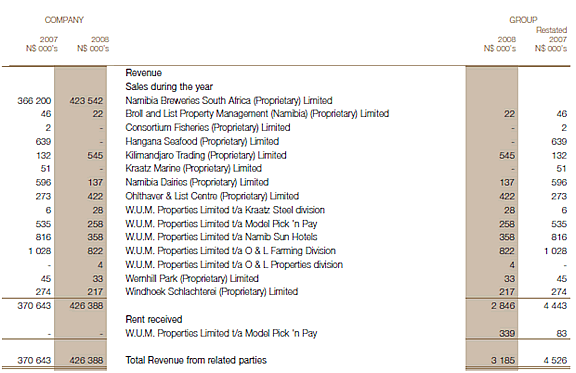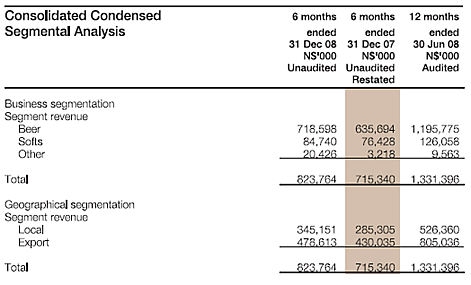 Namibia Breweries Limited (NBL)
Namibia Breweries Limited (NBL)
All data are collected in the Fiscal Year of 2008-2009.
Company Profile and History
NBL was founded in 1920 when Carl List and Hermann Ohlthaver acquired four small breweries with financial difficulties. The breweries were merged together under the name South West Breweries Limited (SWB). SWB changed its name to Namibia Breweries Limited when Namibia gained independence on March 21, 1990. Currently NBL exports 60% of its production to South Africa and 22 other countries world-wide.
In Country Location
Iscor Street, Northern Industrial Area, Windhoek, 9000, Namibia
Services and Products
Other than the four top-selling beers, Windhoek Lager, Windhoek Light, Hansa Pilsener and Tafel Lager, NBL also produces some speciality beers, makes Beck's under license and distributes Guinness and Kilkenny in the region. NBL also has a division called Stortebecker that produces some Schnapps. Its ready-to-drink products include Smirnoff Spin, Smirnoff Storm and Archers Aqua. It also manufactures Foundry Premium Cider, its own range of soft drinks, the McKane range, and also manufactures products from the Pepsi range under license of PepsiCo.
Number of Employees
550
Financial Information



Market Share
NBL is one of the leading beverage manufacturing companies in Namibia. The company is the leader in the domestic beer market. Nambrew estimates it has around 73 per cent of the Namibian beer market. In 2008 the Group grew its beer volumes in Namibia by 8% year on year, driven by the exceptional performance of Windhoek Lager in Namibia.
Business Objective
“Being driven and motivated to pro-actively add value, by means of smart thinking and visionary leadership and to ensure operational excellence through an innovative approach. To encourage calculated risk taking for potential returns, with emphasis on the value of associated learning.”
Business Model
Its business model is mainly focused on investment in innovation, showing financial discipline and by aggressively growing its home market as well as existing export markets through new and complementary ventures. Moreover its strong strategic partnership with Diageo and Heineken has proven to be a valuable platform for employee exchange and knowledge transfer.
During 2008 NBL invested about N$67 million in maintaining as well as enhancing its production capacity. A substantial amount is allocated for the same purpose in 2009 with the main focus on: increasing packaging capacity in order to improve flexibility and provide capacity for future growth; improvement in logistics and warehousing as well as the optimisation thereof; the creation of an independent power network to overcome potential power supply shortages and upgrading of the brewing automation system.
Ownership of Business
The Company’s holding company is NBL Investment Holdings Limited, of which the shareholding is held by OhIthaver & List Finance and Trading Corporation Limited, Heineken International B.V. (“Heineken”) and Diageo plc (“Diageo”). The Company’s ultimate holding company is List Trust Company (Proprietary) Limited.
Benefits Offered and Relations with Government
The government has consistently supported NBL in the 1990’s in its efforts to prevent South African Breweries (SAB) from taking over the Namibian market. For instance in 1993 when SAB offered to put up a bottling plant in Namibia, the Namibian Government rejected the offer.
Also in 1996 when South Africa sprang a whole new set of regulations on its Customs Union partners which increased the duty on Windhoek Light by 60%, the Namibian Government protested at the lack of consultation, and advised NBL not to pay the new duties. The matter was finally resolved a year later, when the finance ministries of South Africa and Namibia agreed to scrap the duties that had been gazetted.
The Government expects the manufacturing industry to create employment, as well as add value to raw materials produced in Namibia. Measures to assist manufacturing development are as follows: Market access developed for exporters; Quality assurance and standards provided by the Namibia Standards Institute; Export promotion assistance provided by the Ministry of Trade & Industry (MTI) as well as the provision of Industrial infrastructure, also by the MTI. The present incentive regime in Namibia will be reviewed and the MTI is in the process of drafting an Industrial Policy for Namibia.
The taxation charge for the year ended 30 June 2008 was N$42.4 million compared to N$33.6 million for the previous year.

Product Development
In line with its aim to develop a winning portfolio of brands, the company’s main focus was set on the launch of the new Reinheitsgebot awareness campaign. The Reinheitsgebot launch provided a platform for communicating the intrinsic qualities of its beers’ unique selling proposition namely the exclusive use of imported malted barley, hops and water, with absolutely no additives, preservatives or colorants. In addition, the “premiumnisation” of the Windhoek Lager returnable sharing pack was successfully initiated in Namibia and receive continuous attention in 2009.
The Group’s South African Joint Venture changed from cost sharing to profit sharing in May 2008, which represents the deepening of the Group’s relationship with Heineken B.V. and Diageo plc. This change resulted in the establishment of a jointly controlled entity called DHN Drinks (Pty) Ltd. DHN Drinks (Pty) Ltd has the sole distribution rights of the products of its shareholders in South Africa. The Board believes that the scale of volumes flowing through DHN Drinks (Pty) Ltd provides opportunities to leverage off the increased distribution footprint and so assist continued volume growth of the Group’s products.
The Group’s export markets (excluding South Africa) continued to develop and reported strong growth in the year under review. Volume growth came predominantly from the Group’s markets in the SADC region and in particular Botswana and Angola with the Windhoek and Heineken brands again delivering a strong performance. The Group is actively pursuing new markets.
Delivering profitable growth in the export markets will continue to be critical to the continued success of the Group.




